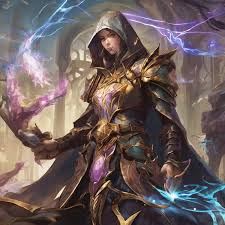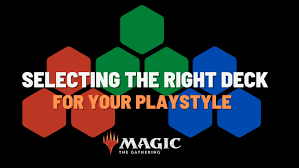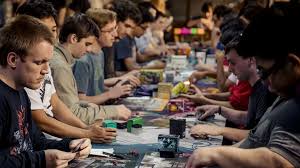Mastering Competitive Deck Building in Magic: The Gathering

Magic: The Gathering isn’t just about playing cards—it’s about strategy, adaptation, and making smart decisions. A well-built deck is key to success, whether you’re competing at a Friday Night Magic event or aiming for top placement at a Grand Prix. If you’re looking to create a deck that stands strong against the competition, here’s a breakdown of what matters most.
Know the Meta and Adapt
The meta—short for metagame—describes the dominant decks and strategies in the competitive scene at any given time. To stay ahead, research what’s winning. Websites like MTGGoldfish provide updates on top-tier decks, giving you an idea of what to expect. Understanding these trends helps you craft a deck that either aligns with the meta or counters it effectively.
Find the Right Playstyle

Not every deck works for every player. Some thrive on aggressive tactics, flooding the board with creatures and finishing the game fast. Others prefer control strategies, answering threats and grinding out wins over time. Combo decks focus on executing specific sequences for game-winning interactions. Knowing your preferred style will make your deck more natural to play and improve your performance.
Optimize Your Mana Curve
A deck’s mana curve—the distribution of cards by casting cost—affects its consistency. Too many expensive spells can leave you stuck in the early game, while too many cheap cards may result in running out of steam too soon. A well-planned curve ensures that you have strong plays at every stage of the game.
Pack the Right Answers
No deck is perfect, but including flexible removal and disruption helps you deal with threats as they come. Efficient removal spells (Fatal Push, Path to Exile) and counterspells (Counterspell, Dovin’s Veto) can shift the tide in your favor. A well-rounded deck can handle various matchups rather than being shut down by a single strategy.
Playtest, Adjust, Repeat
Even the best-built decks need refining. Testing helps identify weak points and opportunities for improvement. Swap cards in and out, adjust for common matchups, and see how your deck functions in real games. Experimentation is key to finding the perfect balance.
Stay Current with New Releases
MTG constantly evolves with new expansions. A card that wasn’t viable last season might become a staple with a new set. Keeping up with new releases ensures your deck remains relevant and competitive.
Engage with the Community

Learning from experienced players can significantly improve your skills. Whether it’s discussing strategies online, watching tournament streams, or playing at your local game store, being part of the MTG community exposes you to fresh perspectives and insights.
Final Thoughts
Competitive deck building is a mix of knowledge, testing, and adaptation. By staying informed, refining your strategy, and constantly improving your deck, you’ll be better prepared to face any challenge. Keep playing, keep learning, and most importantly—enjoy the game!Want to build your next deck? Check out https://mtgetsy.com/ for a wide selection of singles, accessories, and more.



